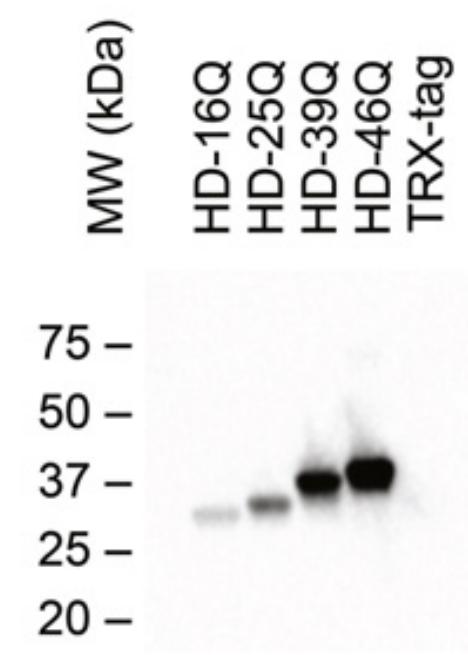Validation Data Gallery
Tested Applications
| Positive WB detected in | Recombinant protein |
Recommended dilution
| Application | Dilution |
|---|---|
| Western Blot (WB) | WB : |
| It is recommended that this reagent should be titrated in each testing system to obtain optimal results. | |
| Sample-dependent, Check data in validation data gallery. | |
Product Information
65239-1-Ig targets Polyglutamine in WB applications and shows reactivity with samples.
| Tested Reactivity | |
| Host / Isotype | Mouse / IgG2b, kappa |
| Class | Monoclonal |
| Type | Antibody |
| Immunogen | Recombinant protein 相同性解析による交差性が予測される生物種 |
| Full Name | Polyglutamine |
| GenBank accession number | N/A |
| Gene Symbol | |
| Gene ID (NCBI) | |
| RRID | AB_3085031 |
| Conjugate | Unconjugated |
| Form | Liquid |
| Purification Method | N/A |
| Storage Buffer | PBS with 0.09% sodium azide , pH 7.3 |
| Storage Conditions | Store at 2-8°C. Stable for one year after shipment. |
Background Information
Huntington's disease is a neurodegenerative disorder caused by the expansion of a polyglutamine (polyQ) repeat in the N-terminal portion of huntingtin protein to a length above 35-40 units (PMID: 26047735; 19507258). The mutational expansion of polyglutamine above a critical length causes a toxic gain of function in huntingtin and results in neuronal death. In the course of the disease, expanded huntingtin is proteolyzed, becomes abnormally folded, and accumulates in oligomers, fibrils, and microscopic inclusions (PMID: 25336039). The anti-polyglutamine (polyQ) antibody MW1 specifically binds the polyQ domain of huntingtin exon 1. On western blot, the MW1 clone strongly prefers to bind to the expanded polyQ repeat form of Htt, displaying no detectable binding to normal huntingtin (PMID: 11719267).
